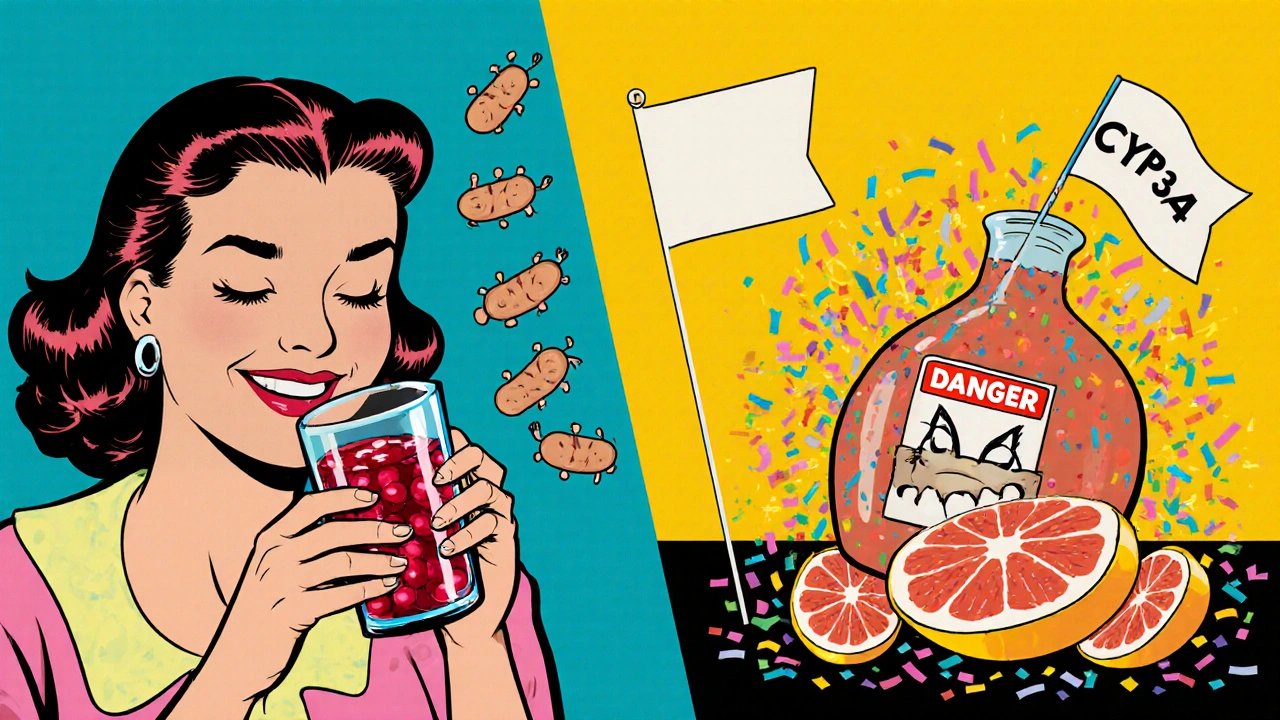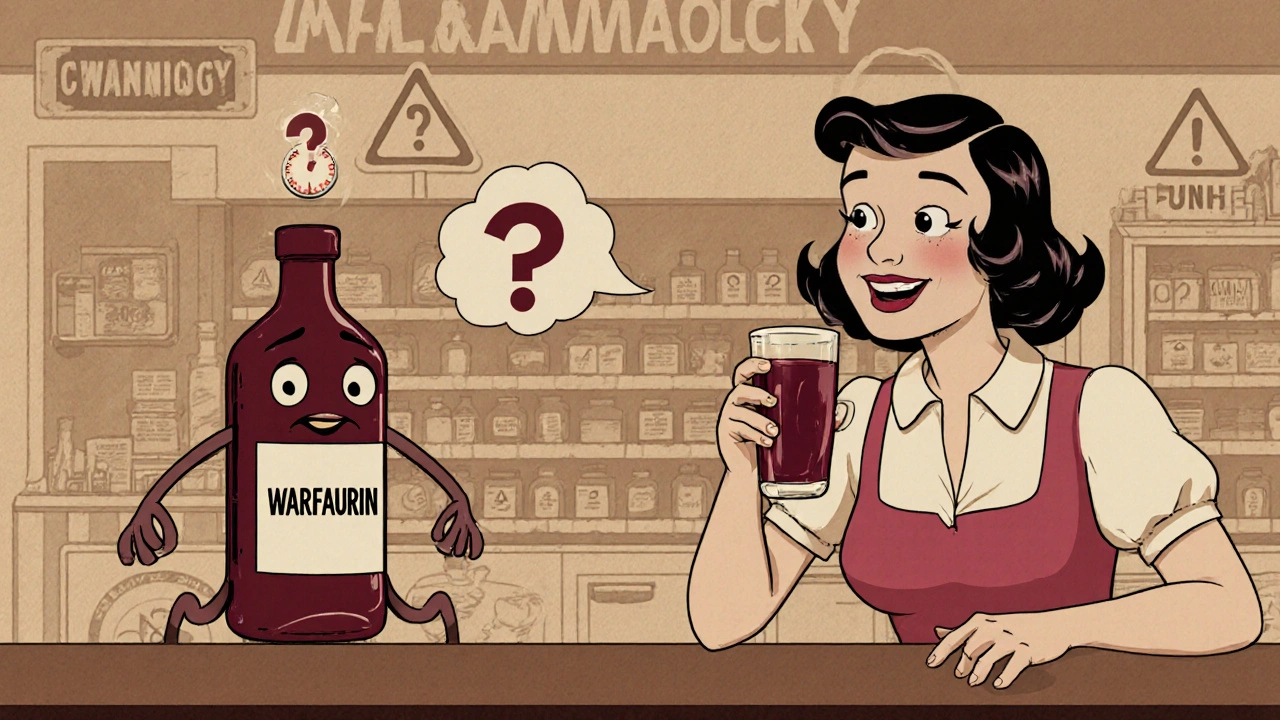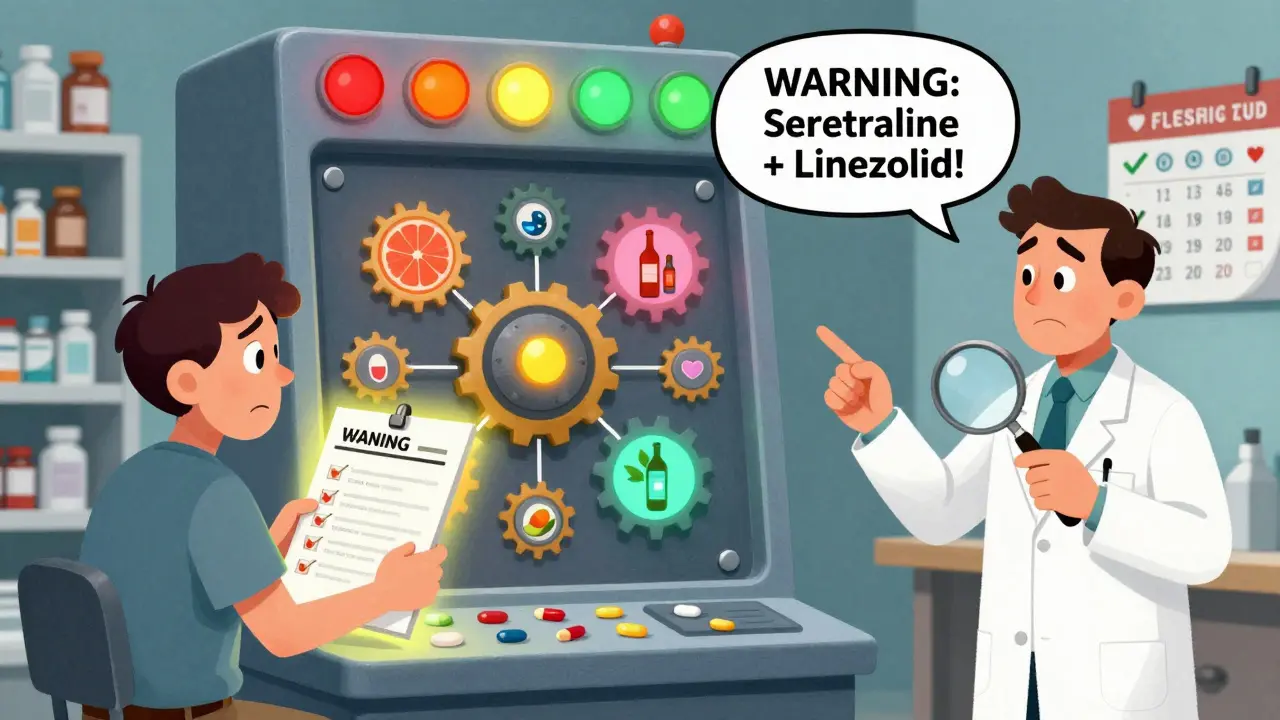Cranberry Juice Medication Interaction Checker
Is Cranberry Juice Safe With Your Medication?
Based on latest scientific evidence from clinical studies (not outdated warnings)
Key Evidence Summary
Warfarin
No consistent increase in INR from regular cranberry juice (up to 750mL daily). Caution with supplements. Monitor INR if using juice consistently.
Antibiotics (Amoxicillin/Cefaclor)
No effect on drug absorption or effectiveness. May help prevent UTI recurrence. Safe to consume together.
Statins (Atorvastatin)
No change in cholesterol levels or muscle pain. No clinically significant interaction.
Many people drink cranberry juice to prevent urinary tract infections, especially women who get them often. But if you're on medication, you've probably heard warnings: cranberry juice might mess with your drugs. Some say it’s dangerous. Others say it’s fine. So what’s the truth?
The Warfarin Myth: Is Cranberry Juice Really Dangerous?
The biggest fear around cranberry juice is its supposed link to warfarin, a blood thinner. Back in 2003, a single case report suggested a man on warfarin had a dangerous spike in his INR (a measure of blood clotting) after drinking cranberry juice. That story went viral. Pharmacies started posting warning signs. Doctors began telling patients to avoid it entirely.
But here’s what didn’t make the headlines: the next 10 years of research. Four well-controlled clinical studies tested this exact scenario. Healthy volunteers took warfarin while drinking up to 750mL of cranberry juice daily for weeks. None showed a consistent rise in INR. One study even gave people cranberry extract pills - still no change.
So why do stories still pop up? Because isolated cases happen. Sometimes, a person’s liver is slow to process drugs. Sometimes, they switch brands of juice or start taking a supplement. Sometimes, they’re also on antibiotics or eating more leafy greens - both of which affect warfarin. These variables get blamed on cranberry juice, but the real culprit is often a mix of factors.
The American College of Clinical Pharmacy says this clearly: avoid cranberry products if you’re on warfarin - not because it’s proven dangerous, but because the risk, however small, could be life-threatening. It’s a precaution, not a proven rule.
What About Antibiotics? The Truth About UTI Prevention
If you’ve ever taken an antibiotic like amoxicillin or cefaclor for a UTI, you’ve probably been told to drink cranberry juice to help it work better. That’s not just folklore. It’s backed by science.
In 2009, researchers at the University of Western Ontario ran a clean study with 18 women. Half took amoxicillin with water. The other half took the same dose with 8oz of cranberry juice cocktail. Results? No difference in how much drug entered the bloodstream. No delay in absorption that mattered. Same with cefaclor. The study was designed to catch even tiny changes - and found none.
Even better, cranberry juice doesn’t interfere with how your body clears these antibiotics. That’s important. Grapefruit juice, for example, can block enzymes that break down drugs, leading to toxic buildup. Cranberry doesn’t do that with antibiotics. Not at normal doses.
So if you’re on antibiotics for a UTI, go ahead and sip your cranberry juice. It won’t hurt your treatment. In fact, it might help prevent another infection down the line.
Alprazolam, Statins, Blood Pressure Meds: What’s the Real Risk?
Let’s talk about other common meds. Alprazolam (Xanax), statins like atorvastatin, and blood pressure pills like amlodipine - all are broken down by liver enzymes, especially CYP3A4. Cranberry juice can block CYP3A4 in a test tube. So, theoretically, it could make these drugs stronger.
But theory doesn’t equal reality.
No clinical study has shown that drinking cranberry juice raises blood levels of alprazolam. No one has reported increased drowsiness or breathing problems from combining it with statins. In fact, a 2020 review of over 300 patients on statins who drank cranberry juice daily found no change in cholesterol levels or muscle pain - two common side effects of statins.
Same with blood pressure meds. No evidence. No reports. No hospital admissions linked to cranberry juice and lisinopril, metoprolol, or hydrochlorothiazide.
So why do some websites still list them as risky? Because they’re copying old lists from 2005. Science moves. Guidelines update. Most current sources - including UpToDate and Mayo Clinic - say there’s no need to avoid these drugs with cranberry juice.

Concentrated Extracts Are a Different Story
Here’s where things get tricky. Most of the studies that found no interaction used standard cranberry juice cocktail - the kind you buy at the grocery store. It’s about 27% cranberry, diluted with water and sugar.
But supplements? Those are different. Some pills or powders contain concentrated cranberry extract with up to 36mg of proanthocyanidins per serving. That’s the active compound linked to enzyme inhibition. And no one has done large-scale studies on these high-dose extracts with medications.
That’s the gap. We know regular juice is safe. We don’t know for sure about pills.
So if you’re taking a supplement - especially one labeled “potent,” “high-strength,” or “proanthocyanidin-rich” - treat it differently. Talk to your pharmacist. Don’t assume it’s the same as juice.
What About Grapefruit Juice? Don’t Mix Them Up
People often confuse cranberry juice with grapefruit juice. Big mistake.
Grapefruit juice is a known drug interaction powerhouse. It blocks enzymes so strongly that it can raise levels of statins, blood pressure meds, and even some anxiety drugs to dangerous levels. The FDA has listed 17 serious interactions with grapefruit.
Cranberry juice? Not even close. It’s a weak inhibitor at best, and only in lab settings. Real people drinking normal amounts? No problem.
If your doctor warned you about grapefruit, don’t assume cranberry is the same. They’re not interchangeable. Confusing them is why so many people avoid cranberry juice unnecessarily.
What Should You Actually Do?
Here’s a simple guide based on real evidence:
- If you’re on warfarin: Avoid cranberry supplements. Stick to one 8oz glass of regular cranberry juice per day - and keep it consistent. Don’t suddenly drink a liter one day and nothing the next. Monitor your INR regularly.
- If you’re on antibiotics for a UTI: Drink cranberry juice. It won’t interfere. It might help prevent recurrence.
- If you’re on statins, blood pressure meds, or antidepressants: You’re fine. No need to cut it out.
- If you’re taking cranberry pills: Talk to your pharmacist. Ask if they contain concentrated extract. If yes, be cautious. If no, you’re likely okay.
- If you’re unsure: Wait two hours between taking your pill and drinking cranberry juice. It’s not proven to help, but it’s harmless and gives you peace of mind.
Bottom line: Fear is spreading faster than facts. Cranberry juice isn’t a silent killer. It’s a mild drink with a small, specific risk - mostly tied to warfarin and concentrated extracts. For most people, it’s safe. For many, it’s helpful.
Why Do So Many Doctors Still Say No?
Because medicine moves slowly. And because one bad outcome - even if rare - can change policy. A patient on warfarin had a stroke after drinking cranberry juice? That’s a headline. A thousand people drank it with no issue? That’s just Tuesday.
Pharmacists are trained to avoid risk. So they tell patients to skip it. Even when the evidence says it’s probably fine. It’s easier to say “don’t do it” than to explain nuance.
But that’s changing. The American Urological Association updated its guidelines in 2021 to say cranberry products are safe for UTI prevention - unless you’re on warfarin. That’s a big shift from their 2010 stance, which warned against all use.
More doctors are catching up. But you don’t have to wait. Use the evidence. Talk to your pharmacist. Ask: “Is this based on science - or just a rumor?”
Can cranberry juice make my blood thinner less effective?
No, cranberry juice doesn’t make blood thinners like warfarin less effective. The concern is that it might make them *more* effective by increasing INR levels, potentially leading to bleeding. But multiple clinical studies show no consistent effect. The risk is low and mostly theoretical. Still, if you’re on warfarin, it’s safest to avoid cranberry supplements and keep your juice intake consistent.
Is it safe to drink cranberry juice while taking antibiotics?
Yes. Clinical studies show that drinking cranberry juice does not affect how your body absorbs or processes common antibiotics like amoxicillin or cefaclor. In fact, cranberry juice may help prevent future UTIs, making it a useful addition to your routine while on antibiotics. There’s no need to separate them by time - just drink normally.
Do cranberry supplements interact with medications differently than juice?
Yes. Regular cranberry juice is diluted and contains low concentrations of active compounds. Supplements, especially those labeled as concentrated or high-potency, can contain 3-10 times more proanthocyanidins. While there’s no proof these cause harm, they haven’t been studied as thoroughly. If you take supplements, talk to your pharmacist - especially if you’re on warfarin, statins, or other drugs metabolized by the liver.
Why do some websites say cranberry juice interacts with statins?
They’re repeating outdated information based on lab studies - not real human results. Cranberry juice can inhibit liver enzymes in a test tube, but in people, it doesn’t raise statin levels enough to cause side effects. Studies tracking cholesterol and muscle pain in people who drank cranberry juice daily found no changes. The risk is negligible.
Should I avoid cranberry juice if I’m on multiple medications?
Not necessarily. Most medications - including blood pressure pills, diabetes drugs, and antidepressants - show no interaction with cranberry juice. The only clear caution is with warfarin and concentrated cranberry supplements. If you’re unsure, check with your pharmacist. They can look up your exact meds and tell you if there’s any real risk.
Final Thought: Don’t Let Fear Stop You From a Healthy Habit
Recurrent UTIs affect 1 in 5 women. Cranberry juice is one of the few natural options with decent evidence to help prevent them. Avoiding it because of unfounded fears means you’re choosing risk - not safety.
The science is clear: for most people, cranberry juice is safe. The real danger isn’t the juice. It’s misinformation. Don’t let a 20-year-old rumor stop you from protecting your health.








Gina Banh
Cranberry juice isn't killing anyone. The real danger is doctors who still quote 2003 case reports like they're gospel. I've been on warfarin for 12 years and drink a glass daily. My INR? Stable. Stop scaring people with ghost stories.
Also, if you're taking supplements labeled 'high-potency,' yeah, maybe hold off. But juice? Chill.
Deirdre Wilson
Wait so… cranberry juice is basically the quiet kid in class who got blamed for the fire alarm? 😅 I always thought it was some kind of potion that could stop blood from clotting… turns out it’s just a tart little berry drink that got caught in the crossfire of bad science and fear-mongering.
Also, grapefruit juice is the villain here. Cranberry? Just trying to help with UTIs. Poor thing.
Damon Stangherlin
Hey, just wanted to say this post was super helpful! I’ve been avoiding cranberry juice for years because my pharmacist said ‘avoid at all costs’ - but now I’m gonna keep drinking my 8oz glass with breakfast. No more guilt!
Also, big props for calling out the supplement trap. Those little pills are sneaky - they don’t even taste like cranberry, just sugar and chemicals.
Thanks for the clarity. 🙌
Ryan C
Let’s be crystal clear: the 2003 case report was a single anecdote with confounding variables - antibiotics, dietary changes, inconsistent INR monitoring - yet it became medical dogma. This is why evidence-based medicine is under siege. The fact that 4 RCTs with 750mL/day doses showed NO SIGNIFICANT INR FLUCTUATION should have buried this myth. But nope. Fear > Data.
Also, cranberry ≠ grapefruit. Please stop conflating them. It’s embarrassing.
And yes - if you’re taking concentrated extracts? Use caution. But juice? You’re fine. End of story. ✅
Dan Rua
I love how this breaks it down so clearly. I’ve been telling my mom for years not to freak out about her cranberry juice while on blood pressure meds - she’s been scared since 2005.
Now I’m sending her this link. She’s gonna be so relieved.
Also, the part about supplements vs juice? Perfect. So many people don’t realize those pills are basically cranberry concentrate. Like drinking 10 glasses in one swallow.
Good work. 👏
Mqondisi Gumede
Cranberry juice safe? You think? In America you drink everything with sugar and call it medicine. In South Africa we drink rooibos and eat pap. No pills no juice no fear. Your medicine is broken. You fear juice because you fear real food. You trust a lab report more than your grandmas wisdom. This is why your people are sick. Cranberry juice? Drink it. Or don't. But stop pretending science has all the answers. You're not smarter than your ancestors.
Douglas Fisher
Thank you… thank you… thank you… for this… this… this incredibly thorough, nuanced, and evidence-based breakdown… I’ve been so confused for years… I thought cranberry juice was a silent assassin… I’ve been drinking it since college… I’m 47… and now I feel… so… much… better… about it…
Also… I’m going to stop avoiding it… and start enjoying it… with my antibiotics… without guilt…
Thank you…
Albert Guasch
It is imperative to underscore that the pharmacokinetic interactions between cranberry juice and pharmaceutical agents are mediated primarily through the cytochrome P450 enzyme system, specifically CYP3A4 and CYP2C9 isoforms. While in vitro studies have demonstrated inhibitory potential, in vivo clinical trials have consistently failed to demonstrate statistically significant alterations in plasma concentration profiles of warfarin, statins, or antihypertensive agents at standard dietary intake levels.
Consequently, the precautionary stance espoused by certain professional societies is not grounded in empirical evidence of harm, but rather in risk-averse clinical conservatism. The continued dissemination of outdated guidelines constitutes a form of iatrogenic misinformation.
Recommendation: Prioritize dietary consistency over arbitrary avoidance.
Ginger Henderson
Wow. So… you’re saying I don’t have to stop drinking my cranberry juice? Like… at all? 😐
But what if I drink it with my coffee? Does that make it worse? Or better? I’m confused again.
stephen riyo
Hey… I just wanted to say… I think you’re right… but… I’m still nervous… I mean… what if… I don’t know… something happens? Like… what if my blood just… stops clotting? Like… overnight? I’m not trying to be dramatic… but… I’ve seen it on TV…
Can I… just… wait two hours? Just to be safe? Even if it’s not proven? I just… need… to feel… in control…
Jaspreet Kaur
Science moves slow but truth moves faster
People fear what they don't understand
Cranberry juice is not a poison
It's a gift from nature that helps women avoid hospital visits
Stop letting fear make you weak
Drink it. Live it. Fight your UTIs with real power
Not with silence
Not with fear
With knowledge
And cranberry juice
And you will be stronger than the myths
Bethany Buckley
It’s rather amusing how the general public still clings to antiquated pharmacological dogma as if it were scripture. The fact that a single, poorly documented case from 2003 continues to influence clinical behavior speaks volumes about the epistemic fragility of modern medicine.
Moreover, the conflation of cranberry juice with grapefruit juice is not merely erroneous-it is intellectually lazy. One is a weak, transient inhibitor; the other is a potent, irreversible modulator of CYP3A4. To equate them is akin to comparing a candle to a flamethrower.
One wonders whether these warnings are rooted in science-or in the fear of litigation.
Cynthia Boen
So… you’re telling me I don’t have to stop drinking this? After all these years? I feel like I’ve been lied to.
Also, why did my doctor make me sign a waiver just to buy it at the pharmacy? Who wrote that? A lawyer? Not a scientist?